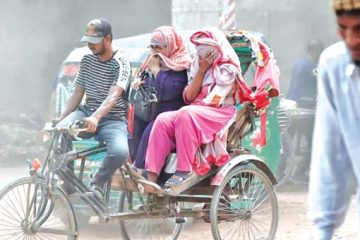Musharraf Tansen
CLIMATE change has evolved from a distant environmental concern to an urgent global crisis, affecting every aspect of human life. Its impact is evident in rising temperatures, extreme weather events, shifting ecosystems and social disruptions. In Bangladesh, one of the world’s most climate-vulnerable nations, the effects are acute: rising sea levels, frequent cyclones, flooding and unpredictable weather patterns threaten both lives and livelihoods. Against this backdrop, education becomes a vital tool for building climate resilience and fostering sustainable practices. By raising awareness, cultivating skills and inspiring action, education can equip individuals, communities and society towards sustainable behaviours and policies that mitigate climate change and promote adaptation to combat climate change effectively.
Raising awareness, climate knowledge
EDUCATION lays the foundation for climate awareness. Integrating climate science into Bangladesh’s curriculum — from primary school to higher education — helps students understand the causes, consequences and complexities of climate change. This foundational knowledge is essential in a country where the links between human activity, carbon emissions, deforestation and environmental degradation are increasingly evident. By understanding these dynamics, students can relate climate change to local challenges, like river erosion and salinity intrusion, which affect Bangladesh’s communities directly.
For example, if students learn how rising sea levels impact agriculture in coastal areas, they are more likely to support policies promoting flood-resistant crop varieties and sustainable farming methods. Climate education can thus build a generation of environmentally literate citizens who make informed, climate-friendly decisions.
Promoting sustainable practices from a young age
TEACHING sustainable habits early on is crucial. Educating young people about energy conservation, waste reduction, responsible consumption and biodiversity preservation fosters lifelong environmental responsibility. Schools across Bangladesh can serve as models by implementing eco-friendly practices, such as waste management, water conservation and recycling programs.
Experiential learning activities — like tree planting campaigns, school gardening, or coastal clean-ups — reinforce these values and demonstrate how individual and collective action can positively impact the environment. As children practice sustainability in schools, they are more likely to carry these habits into adulthood and advocate for similar practices in their families, communities and workplaces.
Cultivating critical thinking and problem-solving skills
ADDRESSING climate change demands critical thinking and innovative solutions. By developing problem-solving skills, education prepares students to tackle complex issues. For example, science classes in Bangladesh can teach students to analyse weather data and climate patterns, while social studies can explore how these changes impact communities socially and economically.
Critical thinking skills enable students to sift through climate information, distinguish credible sources and understand the nuances of scientific data and policy discussions. In a region often affected by climate misinformation, an educated population that can critically assess information is essential for maintaining public support for climate action.
Empowering the youth to lead and advocate
BANGLADESHI youth play an increasingly active role in climate advocacy. Education can empower young people with the knowledge and confidence they need to lead climate initiatives. Youth-led movements, such as environmental clubs and community campaigns, have already emerged in Bangladesh, showing the potential for young voices to influence local and national policy discussions.
Educational institutions can support this trend by offering leadership training, establishing environmental clubs and fostering partnerships with NGOs. By involving students in climate policy projects and awareness campaigns, schools help build the next generation of climate leaders ready to advocate for sustainable change in their communities and beyond.
Enhancing climate resilience and adaptation skills
FOR Bangladesh, climate resilience and adaptation skills are crucial. Education that incorporates resilience training can help individuals and communities respond proactively to climate-related challenges. For instance, farmers can learn about climate-resilient crops, coastal communities can be trained in flood management and families can practice disaster preparedness.
Local educational programs can offer practical training on sustainable water management, soil conservation and flood-resistant agriculture. By emphasising community-specific adaptation strategies, educational initiatives can ensure that individuals are well-prepared to face the challenges of extreme weather, making climate resilience part of everyday life.
Steering careers towards environmental fields
EDUCATION can guide students toward careers that support climate action, such as renewable energy, environmental policy and sustainable agriculture. In our country, higher education institutions can promote programs that develop expertise in these fields. Degrees in environmental science, renewable energy and sustainable business management can lead to careers that directly address climate challenges.
Internships, partnerships with environmental organisations and hands-on training can expose students to real-world climate issues, nurturing a skilled workforce ready to implement sustainable practices across sectors. As the demand for green jobs grows, education can bridge the gap, preparing Bangladesh’s youth for roles essential in the fight against climate change.
Encouraging global citizenship and responsibility
EDUCATION fosters a sense of global citizenship and collective responsibility. Climate change is a global issue, yet Bangladesh bears a disproportionate impact, despite contributing minimally to global emissions. Teaching students about the international dimensions of climate change helps them understand the importance of climate justice and the need for collective action.
Our students who learn about global climate agreements, like the Paris Agreement, gain a sense of empathy and solidarity with other vulnerable communities. This awareness motivates individuals to support policies and practices that prioritise climate justice, recognising that Bangladesh’s fight against climate change is also a call for global accountability.
Supporting policy change and community action
EDUCATED individuals are more likely to engage in policy change efforts and community action, advocating for climate-friendly policies and supporting sustainable practices at the local level. Climate literacy programs in Bangladesh — whether through schools, workshops, or community centres — can empower individuals to push for policies that prioritise renewable energy, conservation and environmental protection.
Engaging with local government, youth advocates and community leaders can amplify these efforts, ensuring that climate actions align with the specific needs of communities across the country. Education in this way builds a foundation for sustained, localised climate action that can influence broader policy goals.
Education as the path to climate resilience
EDUCATION is not only a way to understand climate change but also a powerful tool to drive meaningful action. By raising awareness, promoting sustainable practices and empowering youth, education provides the knowledge, skills and values needed for climate resilience. In a country like Bangladesh, where climate impacts are urgent and widespread, integrating climate education across schools, universities and communities can nurture a generation equipped to face climate challenges head-on.
Through a holistic, interdisciplinary approach, climate education can inspire real change, transforming awareness into measurable action. By fostering a commitment to environmental stewardship, education has the power to safeguard Bangladesh’s future and contribute to a more sustainable, resilient world for all.
Musharraf Tansen is a development analyst and former country representative of Malala Fund.







